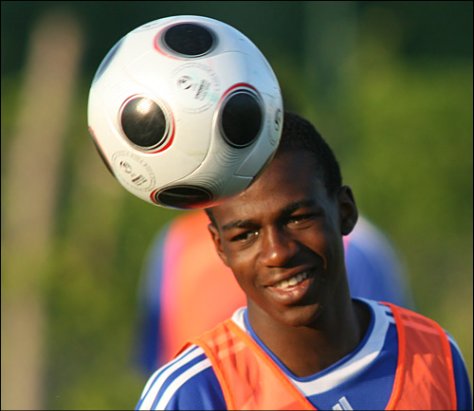Earlier in the week it was UEFA stealing the headlines with their punishment of Eduardo, now FIFA have got in on the act. Chelsea might appeal the ruling with all the might they can muster, but if the worst comes to the worst then perhaps the answer to their problems might lie in the very place that got them in trouble…

Head up: Gael Kakuta might have a bright future, but his club's immediate outlook just got a whole lot bleaker...
It may not be an exaggeration to say that the football world has been rocked by the news of Chelsea’s year-long transfer embargo, imposed on the club by FIFA after the Blues were found guilty of acting improperly in their acquisition of young French midfielder Gael Kakuta.
On top of the ban, which will last for two transfer windows and mean the next opportunity for the club to sign new players will be in January 2011, the club have been ordered to pay compensation to Kakuta’s former club, RC Lens, totalling around $186,000.
Understandably, the Stamford Bridge club are not going to willingly comply with what is an unprecedented, if not unpopular, decision from the game’s governing body.
“Chelsea will mount the strongest appeal possible following the decision of FIFA’s Dispute Resolution Chamber over Gaël Kakuta,” a statement on the club’s website read.
“The sanctions are without precedent to this level and totally disproportionate to the alleged offence and the financial penalty imposed.”
On this, it is arguable Chelsea have a point. The club might well come away from the inevitable hearing with CAS (the Court of Arbitration for Sport) with a reduced embargo, or even just a sizeable fine.
If not, as they have already found out with the recent Adrian Mutu saga, there is always an even higher court to continue their appeal in.
However, no one should be under the illusion that a successful appeal is inevitable. FIFA will not have come to such a decision, especially knowing how much attention it would bring, without a determination to see it enforced.
If little else, it can be taken as read that the organisation will do everything it can to ensure the London club comply to ever aspect of the ‘sentence’ they have passed down.
As such, the Chelsea hierarchy must start making contingency plans (as limited as they may be) in case the punishment imposed on them remains in place, especially as it has such widespread implications on their prospects.
With an already ageing squad (the average age of the first XI this year is over 29), the prospect of not being able to sign fresh blood until January 2011 is something that could well prove detrimental to short-term fortunes.
In that time, they are likely to miss out on long-rumoured targets Sergio Aguero and Franck Ribery, among others. With both players likely to move next summer, Chelsea will have to watch on mournfully as rival clubs fight over players they have long coveted.
Not only that, but they will have little opportunity to respond as key squad members (Drogba, Kalou, Essien) head to the African Cup of Nations in January of this season, or make arrangements next summer to counter the potential impact of certain important players (Drogba, Ballack, Carvalho) hitting an age where their talents will reasonably be expected to diminish rapidly.
Lastly, the club faces the prospect of being held to ransom by its squad players, many of whom might take advantage of the transfer embargo and their own expiring contracts to negotiate inflated wages for themselves that the club will have little option but to pay.
All in all, FIFA’s ruling could destabilise a squad that could arguably be considered the most settled in England just a few days ago.
Many have already taken this as reason enough to right off Chelsea’s chances, if not this season then certainly in 2010-11.
This doesn’t have to be the case, however, as there is some scope for Chelsea to turn FIFA’s decision into something of a positive—by focusing on the one thing that got them into trouble in the first place.
Youth development.
Chelsea’s academy, so expensively maintained and overseen by coaches of international repute since Roman Abramovich’s take-over, has so far failed to produce a notable first-team contributor since John Terry—a player who hit the first-team long before the Russian billionaire ever even flew his helicopter over Fulham Road.
Michael Mancienne might be a player considered worthy of note—indeed, the on-loan Wolves defender will undoubtedly be called upon frequently next season—but beyond him few academy graduates have made the grade in recent teams.
This state of affairs exposes the club’s current youth setup as an abject failure. For all the bluster, Frank Arnesen (now the club’s sporting director, but originally appointed as head of the youth team) has achieved very little in his time at the club.
Now more than ever is the time to refocus on making the academy effective.
Just last week, club chief executive Peter Kenyon called on his club’s youth system to provide the first team with the quality of players it requires, while bemoaning the costs involved.
“Every club is spending more time, more money and more resources on the academy. But the standard which we’re demanding of the players is just going up all the time,” Kenyon said.
“I think we’re all producing more good players but it’s hard to get them to breakthrough at the level we need them and that will take time. The infrastructure is certainly there at our club, it is as good as anyone’s and I’m sure the next John Terry will be coming through.”
Now, more than ever, Kenyon will be hoping his words are prophetic.
And, with no other players to spend money on, resources invested in the club’s youth infrastructure might suddenly be even more plentiful.
Youth development has not just been a problem for Chelsea in recent years; it has been a problem for almost all clubs in England.
While Barcelona started last season’s Champions League final with seven players from their own youth team, the ‘Big Four’ combined would only realistically be able to contribute four—Terry, Steven Gerrard, Jamie Carragher, and Ryan Giggs.
Perhaps that is due to a widespread problem with how English youngsters are introduced to football. Perhaps it is just a cause of poor coaching. Whatever the cause, Chelsea find themselves in an enforced position where they can attempt to do something about it—and gain an unlikely advantage on their rivals in the process.
If they can, then youngsters like Kakuta (the club’s scholar of the year last year), Miroslav Stoch, and Ryan Bertrand might develop enough to reinforce what will become a stale first team squad.
With other junior players like Daniel Sturridge and Nemanja Matic already in the first-team squad and showing great potential, the club might surprise many and be hold things together until the embargo is lifted.
And, as an added bonus, the club might be even stronger in the long run.
No one can reasonably suggest that Chelsea did not have this sort of scenario coming, even if many of their rivals have no doubt indulged in similarly murky practices.
In their pursuit of Ashley Cole and John Obi Mikel, Chelsea were shown to be more than willing to bend the rules, so it can easily be inferred that similar tactics were being employed with the 15 and 16-year-old youngsters the club wanted to attract.
Make no mistake; FIFA’s ruling is a body blow for a club that has become accustomed to life at Europe’s top table. But maybe, even if an appeal fails them, the club can salvage something from the wreckage.
They might not develop an exact substitute for a multi-million pound signing, but perhaps with the right steps a silver lining can be found from what looks an especially dark cloud.
It may not be an exaggeration to say that the football world has been rocked by the news of Chelsea’s year-long transfer embargo, imposed on the club by FIFA after the Blues were found guilty of acting improperly in their acquisition of young French midfielder Gael Kakuta.
On top of the ban, which will last for two transfer windows and mean the next opportunity for the club to sign new players will be in January 2011, the club have been ordered to pay compensation to Kakuta’s former club, RC Lens, totalling around $186,000.
Understandably, the Stamford Bridge club are not going to willingly comply with what is an unprecedented, if not unpopular, decision from the game’s governing body.
“Chelsea will mount the strongest appeal possible following the decision of FIFA’s Dispute Resolution Chamber over Gaël Kakuta,” a statement on the club’s website read.
“The sanctions are without precedent to this level and totally disproportionate to the alleged offence and the financial penalty imposed.”
On this, it is arguable Chelsea have a point. The club might well come away from the inevitable hearing with CAS (the Court of Arbitration for Sport) with a reduced embargo, or even just a sizeable fine.
If not, as they have already found out with the recent Adrian Mutu saga, there is always an even higher court to continue their appeal in.
However, no one should be under the illusion that a successful appeal is inevitable. FIFA will not have come to such a decision, especially knowing how much attention it would bring, without a determination to see it enforced. If little else, it can be taken as read that the organisation will do everything it can to ensure the London club comply to ever aspect of the ‘sentence’ they have passed down.
As such, the Chelsea hierarchy must start making contingency plans (as limited as they may be) in case the punishment imposed on them remains in place, especially as it has such widespread implications on their prospects.
Continue reading →
September 3, 2009
Posted by alexdimond |
Sport, World Football | chelsea, FIFA, gael kakuta |
Leave a comment


